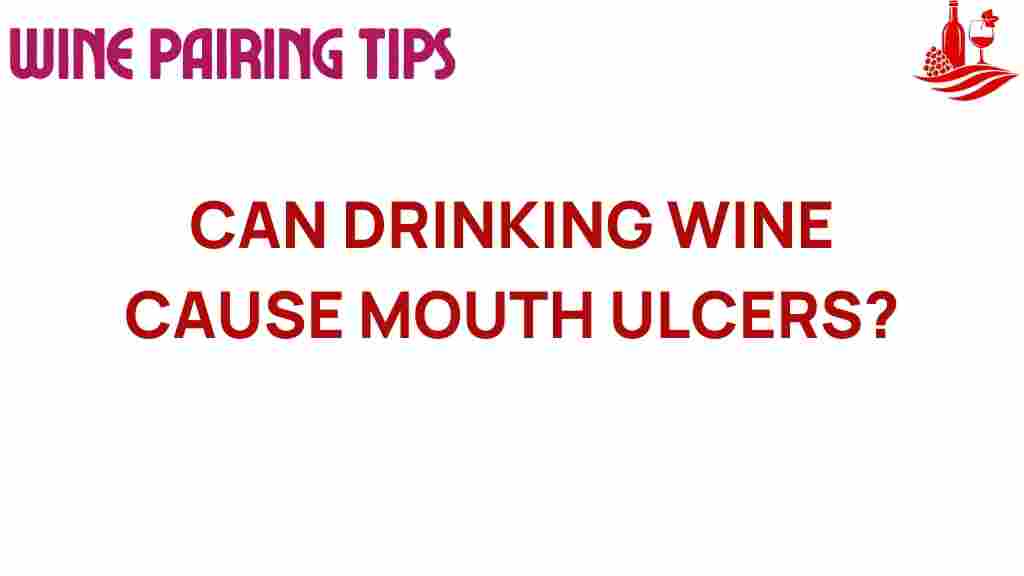Can Drinking Wine Really Lead to Mouth Ulcers?
Wine is a popular beverage enjoyed by many around the world. However, for some, it can be associated with uncomfortable symptoms like mouth ulcers. In this article, we will delve into the relationship between wine, mouth ulcers, and overall oral health, examining the effects of alcohol consumption, food reactions, and providing tips for prevention and dental care. By understanding these factors, you can make informed choices about your health.
The Link Between Wine and Mouth Ulcers
Mouth ulcers, also known as canker sores, are painful lesions that can appear on the inside of the mouth, tongue, or gums. They can be caused by various factors, including:
- Stress
- Hormonal changes
- Certain food reactions
- Injury to the mouth
- Immune system issues
Alcohol consumption, particularly wine, may lead to or exacerbate mouth ulcers due to several reasons:
1. Irritation of Oral Tissues
Wine, particularly red wine, is acidic and can irritate the delicate tissues in the mouth. This irritation can lead to inflammation and potentially trigger the development of mouth ulcers.
2. Allergic Reactions
Some individuals may have allergic reactions to components in wine, such as sulfites or histamines. These reactions can manifest as mouth ulcers or other oral health issues.
3. Dehydration
Alcohol can lead to dehydration, which may dry out the mucous membranes in the mouth. A dry mouth can create an environment conducive to the development of ulcers.
Symptoms of Mouth Ulcers
Recognizing the symptoms of mouth ulcers is essential for early treatment. Common symptoms include:
- Small, painful sores in the mouth
- Red halo around the ulcer
- Burning or tingling sensation
- Pain while eating, drinking, or talking
If you experience these symptoms after consuming wine or other alcoholic beverages, it may be worth considering your oral health and the potential impact of alcohol consumption.
Health Risks Associated with Alcohol Consumption
While moderate wine consumption can have some health benefits, excessive alcohol intake poses several health risks, including:
- Increased risk of mouth ulcers
- Higher likelihood of gum disease
- Risk of oral cancer
- Decreased immune function, leading to infections
Understanding these risks can help you make better choices regarding your alcohol consumption and oral health.
Prevention of Mouth Ulcers Related to Wine Consumption
Preventing mouth ulcers caused by wine consumption involves several proactive steps. Here are some effective strategies:
1. Stay Hydrated
Ensure you drink plenty of water, especially when consuming wine. This helps keep your mouth moist and reduces the risk of irritation.
2. Limit Alcohol Intake
Consider moderating your wine consumption. Limiting the amount you drink may significantly reduce your chances of developing mouth ulcers.
3. Identify Food Reactions
Keep a food diary to track any reactions you have after consuming wine or specific foods. This can help you identify potential triggers.
4. Maintain Good Oral Hygiene
Brush and floss regularly to maintain oral health. Use a soft-bristled toothbrush to avoid irritating the gums and mouth.
5. Use Mouth Rinses
Consider using an alcohol-free mouthwash or saline rinse to soothe the mouth and promote healing.
Dental Care and Regular Check-Ups
Regular dental care is crucial for maintaining oral health. Here are some tips to consider:
- Schedule regular dental check-ups every six months.
- Discuss any symptoms, including mouth ulcers, with your dentist.
- Ask about fluoride treatments and sealants to protect your teeth and gums.
For more information on maintaining good oral health, you can visit ADA Mouth Sores.
Troubleshooting Tips for Mouth Ulcers
If you frequently suffer from mouth ulcers, here are some troubleshooting tips:
1. Avoid Trigger Foods and Beverages
Stay away from spicy, acidic, or abrasive foods. Pay attention to how your mouth reacts to wine and adjust your consumption accordingly.
2. Manage Stress
Stress can contribute to the development of mouth ulcers. Consider stress-reduction techniques such as meditation, yoga, or regular exercise.
3. Consult a Healthcare Professional
If mouth ulcers persist or worsen, consult your doctor or dentist. They may recommend treatments or investigate underlying health conditions.
Conclusion
In conclusion, the relationship between wine and mouth ulcers is complex. While moderate wine consumption may not directly cause mouth ulcers for everyone, it can irritate oral tissues, trigger allergic reactions, and lead to dehydration, all of which may contribute to the development of these painful sores.
By staying informed about the health risks associated with alcohol consumption, recognizing symptoms, and implementing prevention strategies, you can protect your oral health and enjoy wine in moderation. Remember that good dental care and regular check-ups are essential for maintaining a healthy mouth.
For further reading on the impact of alcohol on oral health, check out this article.
This article is in the category Tips and created by Wine Pairing Tips Team
